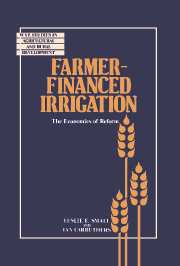Book contents
- Frontmatter
- Contents
- Preface
- 1 Irrigation financing in perspective
- Part I Analysing financing policies: theory and concepts
- 2 Key concepts from economic theory
- 3 Evaluating irrigation financing policies: a conceptual framework
- Part II Criteria for evaluating irrigation financing policies
- Part III Financial autonomy and user fees: key implementation issues
- Notes
- Index
2 - Key concepts from economic theory
Published online by Cambridge University Press: 05 November 2011
- Frontmatter
- Contents
- Preface
- 1 Irrigation financing in perspective
- Part I Analysing financing policies: theory and concepts
- 2 Key concepts from economic theory
- 3 Evaluating irrigation financing policies: a conceptual framework
- Part II Criteria for evaluating irrigation financing policies
- Part III Financial autonomy and user fees: key implementation issues
- Notes
- Index
Summary
There are numerous excellent textbooks of economics and many valuable industrial and agricultural case studies that use economic principles to explore investment and management options using the economist's powerful kitbag of concepts and methods. There have been pioneering studies of this type applied to the water sector in industrialised countries. Irrigation policy studies that address the special problems of low income economies are less numerous.
This book tackles water resource development problems from the perspective of finance. Finance is clearly a crucial aspect of irrigation development and particularly intractable in poor countries. The thesis that underpins this text is:
– Irrigation is important and becoming crucial to food security, employment, and income growth in poor countries.
– Financial problems create shortages and uncertainty of supply of irrigation water that in turn inhibits efficient irrigation and deters complementary investments.
– Financial analysis and prescription is an exercise in political economy but economics provides a valuable conceptual framework to identify options and guide decision makers.
– The criteria or tests to guide action should incorporate these economic insights, albeit with a recognition of their limitations in real world situations.
Economists have a different perspective on technical problems from many professionals. They look carefully at objectives and harder and longer at alternatives, particularly the use of a little more and a little less of any valuable resource. They are concerned with the whole system and not just a part, and with alternative uses of the scarce resources.
- Type
- Chapter
- Information
- Farmer-Financed IrrigationThe Economics of Reform, pp. 16 - 38Publisher: Cambridge University PressPrint publication year: 1991

